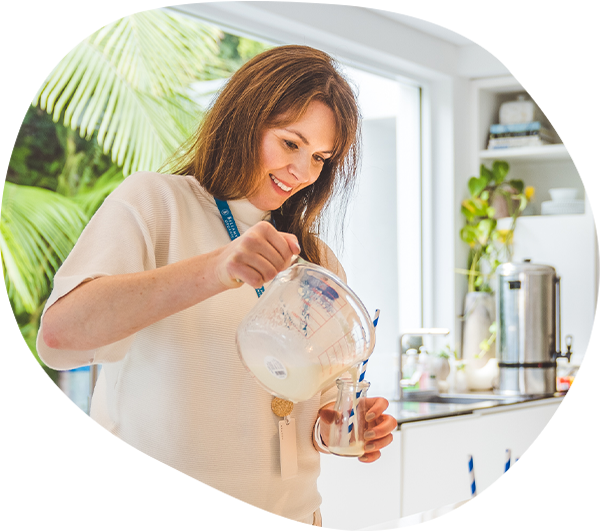Everything You Need To Know About Organic Baby Formula
As parents, we always strive to make the best choices for our little ones, especially when it comes to their nutrition. Organic formula has become a popular choice for many families when exclusive breastfeeding is not possible. But what exactly makes organic formula stand out, and why might it be the right choice for your baby? In this blog, we’ll explore the benefits of choosing organic infant formula and why it might be worth considering for your little one.
Overview Of Organic Baby Formula
1. What is organic baby formula?
Organic baby formula refers to infant formula made from ingredients sourced from organic farming practices and certified according to Australian organic standards. These formulas are produced without synthetic pesticides, synthetic fertilisers, or genetically modified organisms (GMOs), providing a more natural and sustainable option when exclusive breastfeeding is not possible.
Organic baby formulas available in Australia are typically organic cow’s milk based. What distinguishes these formulas is that the cows involved in their production are raised organically, meaning they aren’t exposed to growth hormones or antibiotics.
Two of Australia's most trusted certifications for organic bodies are the Australian Certified Organic (ACO) and the National Association for Sustainable Agriculture (NASSA). These certifications ensure the formula meets stringent organic standards, including regular inspections and audits to verify compliance with organic farming practices to the production of infant formula.
Therefore, when choosing an organic baby formula with the ACO or NASSA logo, parents can have confidence that they are choosing a product that meets rigorous organic certification requirements, ensuring a higher level of purity and quality.
2. How do I know which formula is right for my baby?
Determining the right baby formula involves considering various factors, including their age and any specific dietary needs. It’s also essential to consider whether your baby is mixed-fed or exclusively receiving formula. Start by consulting with your baby’s doctor, who can offer personalised recommendations based on your baby’s needs. If exclusive breastfeeding is not possible, cow’s milk-based formulas are recommended over formulas made from soybeans, goat’s milk, or modified lactose formula.
It’s advisable to choose a formula with a lower protein level and consider additional nutrients like DHA and ARA, as well as features such as added prebiotics or probiotics. Additionally, observe your baby’s response to the formula, including their digestion, tolerance, and growth. If you notice any persistent issues or concerns, consult with your healthcare provider for further guidance and adjustments. Ultimately, the right formula for your baby is one that meets their nutritional needs, supports their growth and development, and is well tolerated.
3. What are the key ingredients in organic formulas?
Organic formula typically includes key ingredients sourced from organic farming practices. These include organic cow’s milk as the protein source, organic vegetable oils for fat content, and organic lactose as a carbohydrate source. Additionally, vitamins and minerals are included in the blend to ensure its nutritional completeness.
These carefully selected ingredients are free from synthetic pesticides, synthetic fertilisers, and genetically modified organisms (GMOs), offering a more natural choice for your baby.
4. Are there different types of organic baby formula?
While organic-certified formulas all adhere to stringent organic standards, there can be variations between brands in their formulation composition. These differences may include the source of the organic milk used and their inclusion of additional nutrients like DHA and ARA, prebiotics, or probiotics, which can vary in their concentration and presence. While each formula meets organic standards, slight discrepancies in ingredients, nutrient content, and processing methods may exist. Therefore, it’s always advisable to carefully review the label and consider consulting with your baby’s paediatrician guidance.
5. How does the cost of organic baby formula compare to regular formula?
Organic baby formula tends to be slightly more expensive compared to regular formula options. This is because organic farming generally operates on a smaller scale, and production is more labour-intensive. Also, without synthetic herbicides, pesticides, and other chemicals, yields are generally smaller.
While organic formulas may come with a slightly higher price tag, many parents find the investment worthwhile for the peace of mind knowing their baby is consuming formula made from ingredients grown without synthetic pesticides, synthetic fertilisers, or genetically modified organisms (GMOs). Additionally, some families opt for regular formula due to budget constraints, while others prioritise organic options for health and environmental reasons, ultimately making the choice based on their individual circumstances and values.
6. Are there regulations governing organic baby formula?
Yes, Australia has established regulations governing organic baby formula. Organic farms must adhere to organic principles for three years before receiving certification. However, it’s important to note that the term ‘organic’ isn’t regulated in Australia, underscoring the importance of choosing products that are certified ‘organic’ by regulatory bodies such as ACO or NASSA. These bodies ensure consistency and traceability from “paddock to plate” by outlining procedures for the production, preparation, transportation, marketing and labelling of organic products.
Organic certified produce guarantees adherence to strict guidelines regarding the avoidance of synthetic chemicals, synthetic fertilisers, and GMO ingredients throughout the production. Additionally, the Food Standards Australia New Zealand (FSANZ) sets regulations for all infant formula products, including organic varieties, to ensure they meet specific safety and nutritional standards.

Health and Nutritional Considerations
7. Is organic formula harder to digest?
Organic formula isn’t harder for babies to digest than regular formula. Digestibility depends on factors like ingredients and individual differences in babies’ digestive systems. While most babies can tolerate the infant formulas available, it may take some time for them to adapt, especially when transitioning from breast milk. If your baby does experience difficulty digesting or shows signs of sensitivity, it's essential to consult with your baby's doctor for personalised guidance and recommendations.
8. Is organic formula better than breast milk?
Breast milk is widely considered the best source of nutrition for infants, as it contains a perfect balance of nutrients and antibodies that support a baby’s immune system and overall growth and development. While organic formula can be a suitable alternative when breastfeeding is not possible, it is not considered superior to breast milk. Breast milk provides unique benefits, such as antibodies and beneficial bacteria, that are not present in the formula. Additionally, breast milk is easily digested and specifically tailored to meet a baby’s nutritional needs. However, every mother and baby’s situation is different, and for some families, organic formula may be a necessary or preferred choice.
9. What is the healthiest formula for your baby?
Breast milk is widely considered the healthiest option for infants, providing a unique blend of nutrients and antibodies that help protect against infection and diseases. It provides the ideal nutrition for the first six months of life and continues to be an important part of their diet for the first year and beyond. It is easily digestible and supports optimal growth and development.
For mothers who are unable to breastfeed or choose not to, infant formula is the recommended alternative. When choosing an infant formula, it is recommended to select a cow’s milk-based formula that has low protein levels, as breast milk is naturally low in protein.
It’s important to note that all formulas in the market meet strict nutritional criteria, so there are no specific recommendations beyond protein levels. Additionally, a formula recommended in the hospital does not necessarily mean it is the best choice for every infant.
10. Which formula is closest to breast milk?
Cow’s milk-based formulas are typically considered the closest composition to breast milk. These formulas strive to replicate the nutritional profile of breast milk, containing a blend of cow’s milk proteins, lactose as a carbohydrate source, and a mix of fats, vitamins, and minerals. While no formula can perfectly replicate breast milk, cow’s milk-based formulas are formulated to provide essential nutrients in propositions that more closely resemble those found in breast milk, making them a suitable choice for infants.
11. Can organic formula be used for preterm infants?
Organic formula can indeed be considered for preterm infants, but it’s essential to consult with your baby’s doctor before making any decisions regarding feeding. Preterm babies may require specialised preparations or the addition of a human milk fortifier. This is because preterm infants have unique nutritional needs, including higher protein and energy requirements, to support their rapid growth and development outside the womb.
Organic formulas are known for being free from synthetic pesticides, synthetic fertilisers, and genetically modified organisms (GMOs), which can be beneficial for infants. However, it is important to seek guidance from Healthcare Professionals, including paediatricians and neonatologists, who can recommend the most suitable type of formula and feeding regimen tailored to the specific needs of preterm infants to ensure optimal growth and development.
12. Can organic formulas be used for babies with medical conditions?
Organic formulas may be used for babies with medical conditions, but it’s imperative to consult with your baby’s doctor before making any decisions regarding their use. Babies with medical conditions often have unique dietary requirements that necessitate specialised formulas or preparations tailored to their needs. While organic formulas offer benefits such as being free from synthetic pesticides, fertilisers and GMOs, their suitability for infants with medical conditions depends on factors like the baby’s condition and the formula’s nutrient composition. Medical professionals, including paediatricians and specialists, can provide personalised guidance on selecting the most appropriate formula to ensure optimal nutrition and support for the baby’s health and development.

Choosing a Formula
13. Is it worth buying organic formula?
Deciding on whether to invest in organic baby formula involves considering various factors, including personal values, budget considerations, and the specific needs of the baby. While organic formulas may have a slightly higher price, the difference in cost compared to non-organic options is significant. This is because organic farming generally operates on a smaller scale and production is more labour intensive. Also, yields are generally smaller without synthetic herbicides, pesticides, and other chemicals.
Organic formulas offer benefits such as ingredients sourced from organic farming practices, free from synthetic pesticides, synthetic fertilisers, and genetically modified organisms (GMOs). Organic formula may offer peace of mind for parents who prioritise providing their baby with the purest, most natural nourishment when breastfeeding is not possible.
14. Can you switch between non-organic and organic formulas?
Switching between organic and non-organic formula for babies is generally safe, but it’s important to do so gradually. Both organic and non-organic formulas meet strict nutritional standards and provide essential nutrients necessary for growth and development. However, sudden changes in formula type can sometimes cause temporary digestive discomfort, such as gas or constipation, in some babies. Gradually transitioning by mixing small amounts of the new formula with the old one over a week can help minimise potential digestive issues.
15. How do I choose an organic formula?
When choosing an organic baby formula, opting for certified organic products ensures adherence to stringent standards, guaranteeing the integrity and traceability of organic products from 'paddock to plate'. Look for recognisable certifications such as the 'Certified Organic' label from Australian Certified Organic or the 'NASAA Certified Organic' label from the National Association for Sustainable Agriculture Australia. While certification is compulsory for exported organic produce to meet the National Standard for Organic and Biodynamic Produce, it's voluntary for domestic and imported foods to comply with the Australia National Standard for Organic and Biodynamic Produce.
While organic-certified formulas all adhere to stringent organic standards, there can be variations between brands in their formulation composition. Carefully review the ingredients list and nutritional panel. Additionally, consider aspects like affordability, availability, and personal values when deciding.
16. What baby formula is recommended by paediatricians?
When seeking baby formula recommendations, paediatricians typically advise opting for cow’s milk-based formula and the ones with the lowest protein levels. Given that breast milk is naturally low in protein, it’s advisable to seek formulas that mirror this composition. This similarity in nutrient profile helps ensure that the baby’s growth and development are more closely aligned with those of a breastfed infant. All formulas available in Australia are considered nutritious and safe, meeting strict standards.
17. What formula is best for a newborn?
Choosing the best infant formula for your newborn depends on various factors, such as your baby’s needs, specific dietary considerations, and guidance from healthcare professionals. In general, cow’s milk-based infant formulas are commonly recommended for newborns as they more closely mimic the composition of breast milk and are generally well tolerated. Look for formulas labelled suitable for newborns, infants from birth, step 1 or stage 1.
Consider factors such low protein levels and additional nutrients like DHA and ARA, and special features such as added prebiotics or probiotics. However, it’s essential to consult with your baby’s doctor to determine the most suitable formula for your baby if breastfeeding is not possible.
18. What formula is easiest on a baby’s stomach?
Breast milk is the easiest to digest for infants due to its composition, which is naturally tailored to meet the needs of an infant, making it the ideal source of nutrition for babies.
The recommended formula for a baby after breast milk is a cow’s milk-based formula. These formulas are designed to be digestible and provide the necessary nutrition for infants who are not breastfed. Cow’s milk-based formulas are generally well tolerated by most babies and are a suitable alternative when breastfeeding is not possible. If you have any concerns about your baby’s digestion or tolerance to a formula, it’s always best to consult with your paediatrician.
19. How do I try different formulas for my baby?
To transition to a new formula, we recommend following a gradual approach using our seven-day transition plan:
Day 1: Start by offering one bottle of the new formula for your baby’s first feed. For the remaining feeds of the day, continue using the previous formula.
Day 2: Increase the amount of new formula by offering it for the first two feeds of the day. Use the previous formula for the remaining feeds.
Day 3: Progress further by offering the new formula for the first three feeds of the day. Again, use the previous formula for the remaining feeds.
Day 4-7: Continue this gradual transition method, gradually increasing the number of feeds with the new formula each day. By the end of the seven-day period, your baby should be fully transitioned to the new formula.
We encourage you to transition slowly using this plan to help minimise any potential digestive discomfort or issues for your baby. Please consult your baby's doctor for further guidance and support if you notice any adverse reactions or concerns during the transition process.
20. Is it safe to try different formulas?
Yes, it's generally safe to explore different formulas for your baby if they're not tolerating one or if you have specific reasons for a change, although it's only necessary if there are concerns. However, frequent changes are not recommended. Babies need time to adapt to a new formula, and frequent switches can create confusion and increase the risk of incorrect preparation or dosing. It's advisable to transition formulas gradually to give your baby time to adjust comfortably.
21. How long should I try a formula before switching to another?
Determining when to switch formulas depends on factors such as your baby’s needs and any specific concerns you may have. In general, it’s advisable to give a formula a fair trial period, typically around two weeks. This allows your baby’s digestive system sufficient time to adapt and gives you the chance to observe any potential reactions or improvements.
However, if you notice persistent issues such as excessive fussiness, gas, discomfort, or adverse reactions, it may be necessary to consider changing formulas sooner. Since every baby is different, closely monitoring your baby’s response and seeking guidance from a healthcare professional if needed.

Mix Feeding and Changing Formula
22. Can you mix formula and breast milk?
Yes, it’s possible to mix breast milk and formula. This can be helpful for parents who are supplementing breastfeeding with formula or transitioning their baby from breast milk to formula. However, if you suspect that your milk supply may be low, it's advisable to seek assistance from a lactation consultant to explore ways to increase your supply first.
It's important to note that introducing formula and regular mixed feeding can potentially make it more challenging to maintain breastfeeding. Therefore, it may be helpful to collaborate closely with a child health nurse, breastfeeding counsellor, or lactation consultant to determine the appropriate amount of formula to use and to develop strategies to preserve your breast milk supply.
23. What are the disadvantages of mixed feeding?
While mixed feeding can provide flexibility and convenience, it's important to emphasise that the advantages of breastfeeding outweigh the potential drawbacks. Breast milk is widely recognised as the optimal source of nutrition for infants, offering essential nutrients and antibodies that promote healthy growth and development. Therefore, the more breast milk a mother can provide her baby, the better.
While some mothers successfully manage a combination of breastfeeding and formula feeding for an extended period, others may find it challenging to maintain their milk supply. It's important to note that the more formula a baby consumes, the less milk the mother's breasts produce.
Additionally, some babies may develop a preference for bottle feeding, which can lead to reluctance to nurse from the breast, a distressing experience for many mothers who wish to continue breastfeeding. Seeking guidance from a child health nurse, breastfeeding counsellor, or lactation consultant can be immensely helpful in navigating this delicate balance. These professionals can assist in determining the appropriate amount of formula to use and offer strategies to maintain the breast milk supply.
However, supplementing with formula may be necessary in certain situations to ensure the baby receives adequate nutrition. It's crucial for mothers to seek guidance from a child health nurse, breastfeeding counsellor, or lactation consultant to determine the best feeding approach for their baby's individual needs, prioritising the baby's health and well-being above all else.
24. What is the easiest formula to transition from breast milk?
All infant formulas are designed to meet stringent standards and provide complete nutrition for infants. Therefore, there isn't a single formula that's universally easiest for transitioning from breast milk. It often depends on your baby's preferences and tolerance. It's advisable to introduce formula gradually to allow your baby time to adjust, given the differences in composition. Consulting with your baby’s doctor, child health nurse, breastfeeding counsellor, or lactation consultant can help you with the transition.
25. Can I go straight from breast milk to formula?
Yes, it is feasible to transition directly from breastfeeding to formula feeding if exclusive breastfeeding is not possible. Breast milk is recognised as the optimal source of nutrition for infants, offering essential nutrients and antibodies that promote healthy growth and development. Therefore, the more breast milk a mother can provide her baby, the better. If considering a switch, consulting with your baby’s doctor, child health nurse, breastfeeding counsellor, or lactation consultant can provide valuable guidance and support to ensure a smooth transition.
26. What are the side effects of switching from formula to milk?
According to the Australian Infant Feeding Guidelines cow’s milk is not recommended as the main drink for infants under 12 months. While cow's milk is nutritious for those over 1 year, it lacks essential nutrients vital for optimal growth and development during this crucial stage. This deficiency may result in nutritional gaps and hindered growth. Moreover, the lower iron content in cow's milk increases the risk of iron deficiency anaemia in infants. Therefore, it's crucial to rely on infant formula as the only safe alternative for infants under 12 months if breast milk is unavailable.

Other Questions
27. How should organic baby formula be prepared and stored?
Organic baby formula should be prepared by following the instructions on the packaging, which typically involves mixing a specific amount of water with the appropriate number of scoops of formula powder. It’s important to boil safe drinking water and allow it to cool to the feeding temperature before adding the formula powder.
Prepared formula should be consumed immediately or refrigerated and used within 24 hours to prevent bacterial growth. Unopened containers of formula should be stored in a cool, dry place and, once opened, used within the timeframe specified on the packaging for optimal freshness and quality.
28. What can I give my baby if I run out of formula?
If you find yourself without formula and unable to get more right away, there are a few safe temporary options to feed your baby. If you’re breastfeeding, offering expressed breast milk is a nutritious alternative. If you cannot, you can ask someone for help by going to the supermarket or pharmacy on your behalf, visiting a local baby food bank, or reaching out to family and friends. In urgent situations, hospitals are available for immediate assistance and guidance.
29. What is the environmental impact of organic formula production?
Organic formula production generally boasts a lower environmental impact than conventional formula production due to its adherence to sustainable farming practices. Modern conventional farming methods include excessive use of chemicals and planting only one crop multiple times (monocropping). This has led to a decline in soil fertility and increased salinity and blue-green algae in waterways over many years. Organic farmers try to minimise environmental damage by diversifying their crops, using physical weed control, and animal and green manure.
By avoiding synthetic pesticides, synthetic fertilisers, and genetically modified organisms (GMOs), organic farming helps to minimise soil and water contamination, promote biodiversity, and enhance soil health. Thus, choosing an organic formula aligns with environmentally conscious practices and supports sustainable agriculture.
30. What are some of the common misconceptions about organic baby formula?
Common misconceptions about organic baby formula include:
● Organic formulas are always more expensive: While organic formulas can be more expensive than conventional options, the price difference can vary depending on the brand. Some organic formulas may be more affordable than conventional formulas, so it’s worth comparing prices and considering other factors like ingredients and nutritional content.
● Organic formulas are not well regulated: Some people believe that because organic products are not well regulated, they may not be as safe or effective. However, organic formulas are subject to strict regulations and must meet specific standards to be certified.
● Organic formulas are not as effective: Some people believe that organic formulas are not as effective as conventional formulas in providing the necessary nutrients for a baby’s growth and development. However, in addition to meeting organic criteria, organic formulas must also meet the same nutritional standards as conventional formulas, providing the same level of nutrition for babies.
● Organic formulas are more likely to spoil: Some people believe that organic formulas are more likely to spoil because they do not contain artificial preservatives. However, organic formulas undergo rigorous testing to ensure they are safe and shelf-stable.
● Organic formulas are just a marketing gimmick: Some people believe that the ‘organic’ label is just a marketing tactic and there are no real benefits to choosing organic formulas. However, for a formula to be certified rigorous standards and regulations must be met to ensure the product meets the criteria.
● Organic formulas taste different: Some people believe that organic formulas have a different taste compared to conventional formulas. However, most babies do not notice a difference in taste, and organic formulas are designed to be palatable for infants. Most people actually think organic foods taste better!
Choosing the right formula for your baby is an important decision, and organic baby formula offers a range of benefits that make it worth considering. So why not give your little one the purest start in life with organic baby formula when breastfeeding is not possible? Your baby and the planet will thank you for it.

































.png?v=1718767604213)





